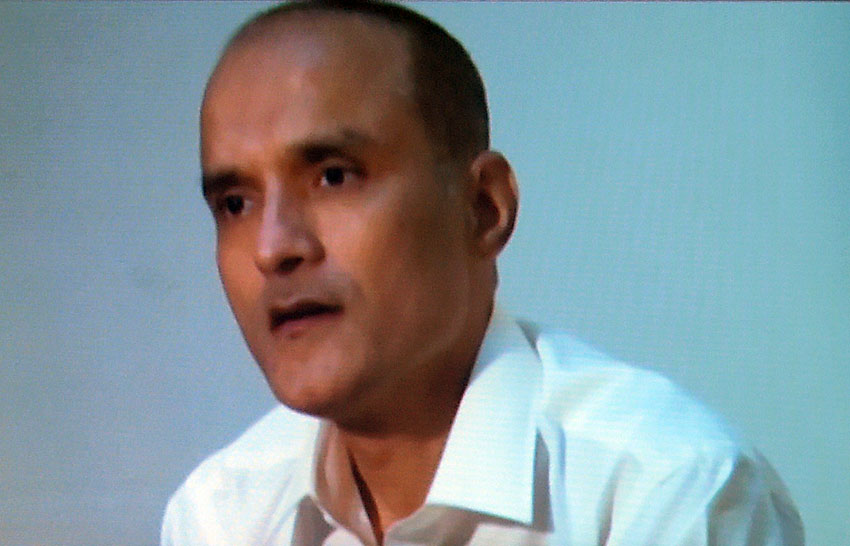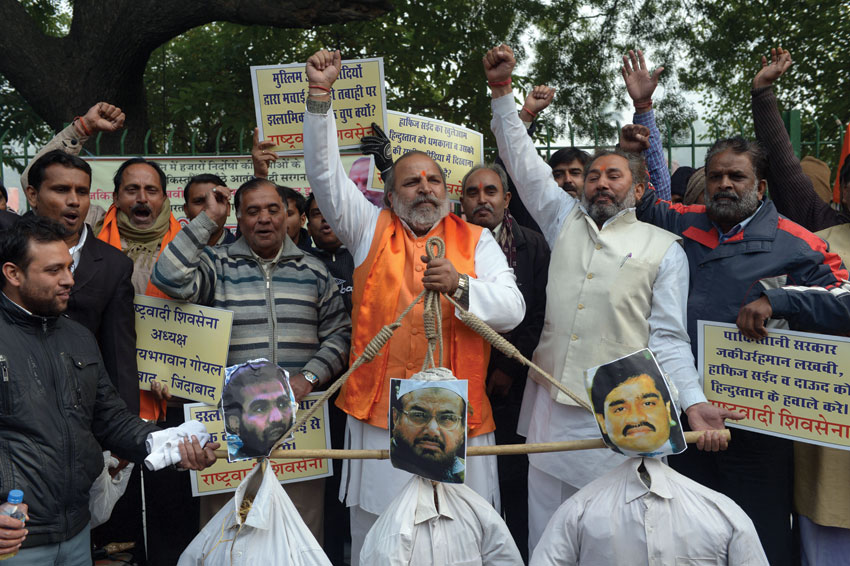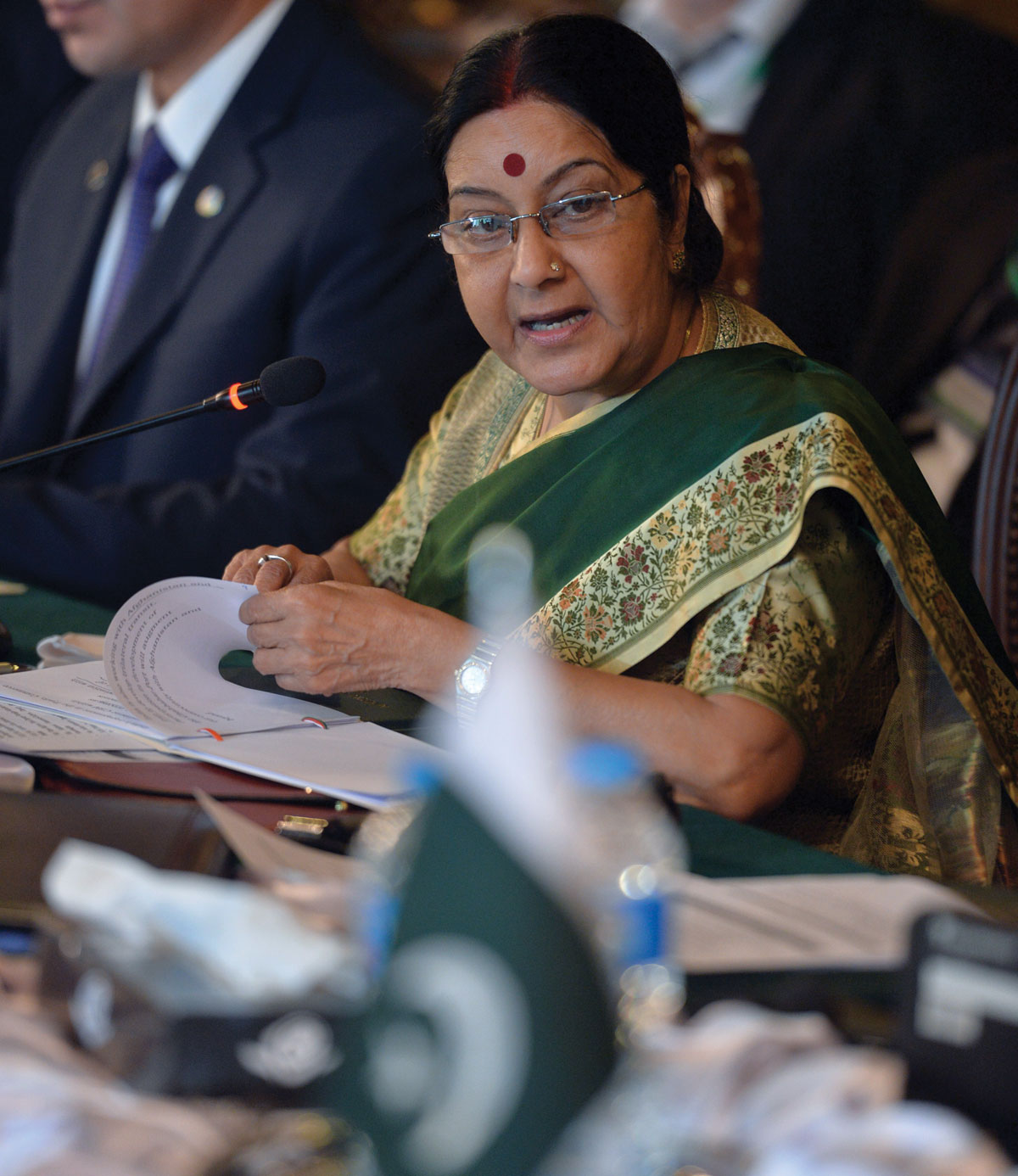Indo-Pak Relations at an Inflection Point: Will Pakistan’s Spy Games be Its End Game?
File photo of Indian Foreign Minister Sushma Swaraj as she makes a speech on the First day of the Heart of Asia conference in Islamabad on December 9, 2015. (Aamir Qureshi/AFP/Getty Images)
@Siliconeer #Siliconeer #India #Pakistan #IndoPakRelations #KulbhushanJadhav #IndoPakRelations #RAW @NaMo #NaMo @Narendramodi #NarendraModi @SushmaSwaraj – Relations between India and Pakistan, two nuclear-tipped South Asian neighbors, have dipped to a new low with Pakistan’s sudden announcement of the award of death sentence to Kulbhushan Jadhav, writes Priyanka Bhardwaj.
In what appears to be a clear case of “provocation” and “display of macho” the Field General Court Martial under the Pakistan Army Act and in an in-camera trial labeled “Kulbhushan Jadhav, a Bharatiya (Indian),” charged him with carrying out espionage and subversive activities in its restive and largest province of Balochistan and decided upon his execution.
Coming down with swift sharpness, the Indian Government categorically denied all allegations of any wrong doing by Research & Analysis Wing (R&AW), India’s primary foreign intelligence agency, and its citizen Jadhav on Pakistani soil, and decried Islamabad’s blatant violation of human rights for not allowing Consular Access to Jadhav, no less than thirteen times, not giving him any chance of a free and fair trial in an open court, along with not taking the Indian High Commission in Pakistan into confidence as per Article 36 of the Vienna Conventions to which both the countries are signatories.
The fact that a civilian was tried in an army court and with no concrete evidence while global fugitives such as 26/11 mastermind, Hafiz Saeed, dreaded terrorist, Zaki Ur Rehman Lakhvi and underworld don, Dawood Ibrahim, roam around freely in Pakistan speaks of its long and flawed history of malafide intentions.

Indian External Affairs Minister Sushma Swaraj, who is fully backed by the country’s polity, civilians and media, described Jadhav’s “arrest and subsequent trial” “fishy and farcical” and warned Pakistan that if it carries out the execution of Jadhav, “it would be considered as a ‘premeditated murder’ and Pakistan should be ready to face the consequences.”
A year back when Islamabad had released a five minute confessional video tape of Kulbhushan Jadhav New Delhi had promptly owned up its citizen and rejected that Jadhav was any spy and questioned the credibility of Pakistan-provided “doctored tape” that had 102 cuts and super-imposed dialogs attributed to Jadhav.
In every indication, Jadhav who is a retired Indian naval official had been conducting cargo business in his private capacity at Iran’s Gwadar Port at Chabahar, where he was abducted by the Taliban, sold to Pakistani Intelligence who took him into Pakistan, and then framed him on fabricated charges.
In April of last year when this news first became public, a well known Afghan journalist, Malik Achakzai had tweeted, “The story of Indian #RAW spy is as fake as others; he’s sold by the smugglers mafia on Iranian territory a source from the area told.”
Similar views were shared by a former German diplomat to Pakistan, Guntar Mulack to a leading Pakistan daily, and Iranian investigation in this matter remains inconclusive.
That the official Pakistani press release variously names the concerned Indian as “Kulbhushan Sudhir Jadhav” and “Kulbhushan Sudhir Yadav” betrays Pakistani confusion.
Furthermore, it is not a standard practice that a spy is caught with his country’s passport, nor does any country own up its spy, as has been the case here.
All these gaps in the Pakistani story most definitely swelled its compulsions to push for a hasty and closed trial.
During the Cold War the U.S. and the USSR displayed civility to spies caught on either side and conducted peaceful swap exchanges.
Therefore Pakistan’s handling of the Jadhav case cannot be termed negligent but one in a series of its past mistreatment of Indian prisoners who are caught under mysterious circumstances on its soil and then end up getting killed by other jail inmates soon after their convictions, displaying disregard for reciprocity.
In sharp contrast stands India’s commitment to line its actions with the UN Charter and International Covenant and Conventions and an example of this was the right to self defense in a long and open trial extended to the 26/11 Pakistani terrorist, Ajmal Kasab, who was caught red handed, and the supply of seven dossiers to Islamabad.

Sources inform that though fresh requests for consular access have been rejected, India is seeking certified copies of proceedings of Court of Inquiry, summary of evidence and medical report in Jadhav case, legal assistance to defend Jadhav in appeal, and preparing visas for family members to visit Pakistan for legal process.
Meanwhile the Indian American community in the U.S. has also launched a White House petition (“We the People Petition”) that requires 100,000 signatures by May 14th to qualify for a response from the Trump Administration.
What is perplexing is that why should Pakistan announce the death sentence at this time and what is so special about Jadhav for them to get after him.
There are plausible reasons, one that Deep State of Pakistan, consisting of its ISI, military and Taliban that effectively run their country and dictate to their Prime Minister, wants to pinprick India after its subversive actions in Kashmir have been thwarted to an extent lately, enable the Pakistan to divert public attention from the real issues it is afflicted with, draw international attention to its yarn of India sponsored terror activities in Pakistan.
Each time Islamabad plays a new tune, New Delhi has always tried hard to play catch up, assured in its belief that it can get away with anything and everything with India or any other Western power.
That it is in a sweet spot with China for investments in China Pakistan Economic Corridor and as leverage against India’s claims over territories, and its joint military engagement with Russia have emboldened it further.
But with the development of the new situation India has reached an inflection point and it needs elements of surprise, innovation and aggression in its military, diplomatic and non nuclear options packaged as a new Pakistan policy that will translate into an end game – live like a peaceful, progressive ad strong smaller nation in the South Asian neighborhood or face inevitable decimation.
This policy will need to be considerable, consistent and caliberated as it deals with a convoluted state that is known to have sheltered Osama Bin Laden in Abbotabad for a period of not less than six years while being considered an ally in the ‘War Against Terror’ by the U.S.
The government is also receiving ‘hawkish’ advisories of taking that one step to declaring a Baloch government in exile just like the Tibetan government of Dalai Lama’s.
The next few months will test if India’s will and capacity can measure up to its fury and get it to adopt a hard approach that will work in aligning global community in bearing considerable pressure on Pakistan to mend ways.


